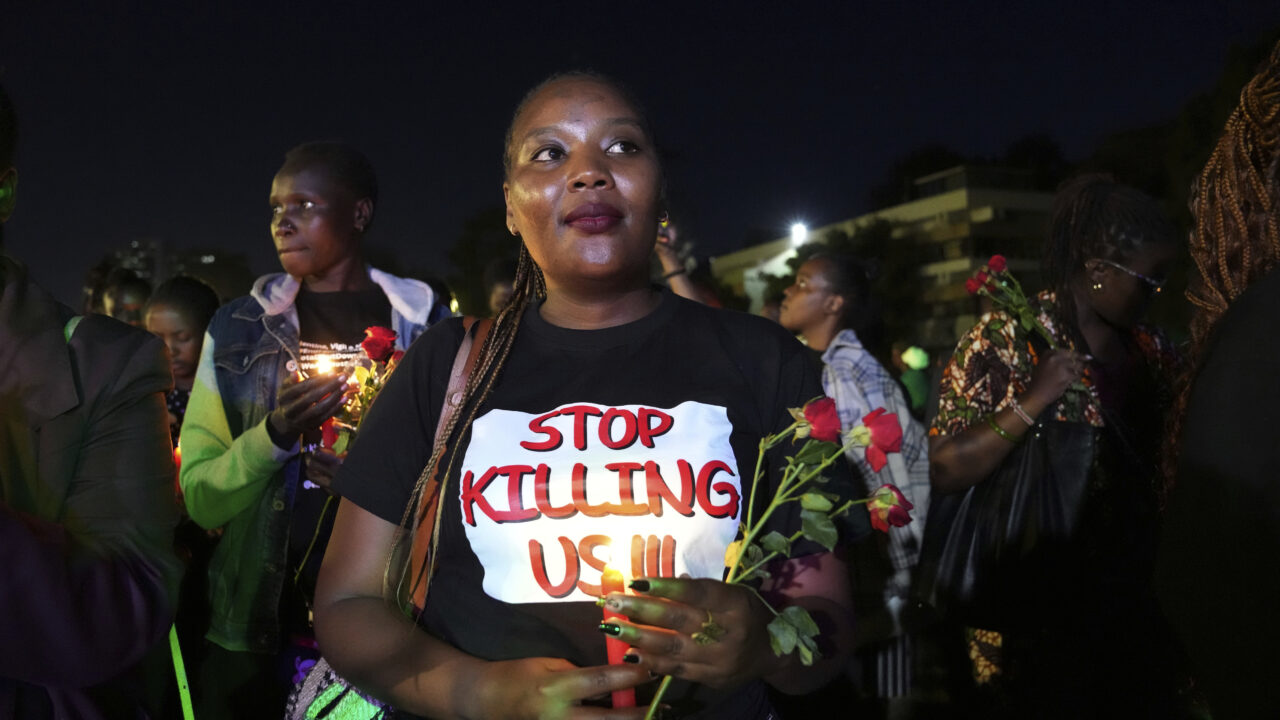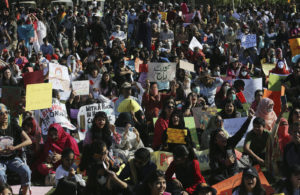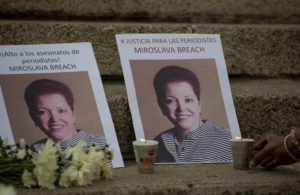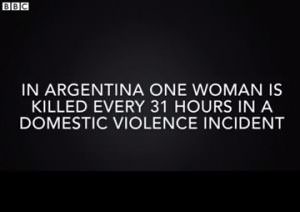A Grassroots Movement Mobilizes Against Femicide in Kenya
Organizers are fighting for wide-ranging reforms and an end to systemic violence against women. Women hold candles and flowers during a "Dark Valentine" vigil to demonstrate against the rising cases of femicide, in downtown Nairobi, Kenya, Wednesday, Feb. 14, 2024. (AP Photo/Brian Inganga)
Women hold candles and flowers during a "Dark Valentine" vigil to demonstrate against the rising cases of femicide, in downtown Nairobi, Kenya, Wednesday, Feb. 14, 2024. (AP Photo/Brian Inganga)
NAIROBI, KENYA — As dusk fell on Valentine’s Day, a few hundred young people gathered in the graduation square at the University of Nairobi. Dressed in black t-shirts for an event dubbed “Dark Valentine,” they performed a solemn vigil in honor of Kenyan women and girls who have lost their lives to gender-based violence in the last several years. The names of victims were read aloud, followed by the chant, “Say her name.”
Rita Waeni — say her name — a 20-year-old student at Jomo Kenyatta University, allegedly killed and dismembered in January by a man she met on Instagram. Mercy Keino — say her name — another university student whose murder remains unsolved. The recitation continued into the night: Baby Bree. Say her name. Beryl Ouma. Say her name.
During the month of January, U.N. Women reports that at least 10 Kenyan women were victims of femicide, a category of murder recognized by the U.N. that is defined as the targeted killing of girls or women because of their sex or gender. Based on cases reported in the English media, Africa Data Hub counts 500 cases of femicide since 2016. The real number is likely much higher.
According to Mutuma Ruteere, director of Kenya’s National Crime Research Centre, two women are killed every day in Kenya. Globally, the U.N. reports that, on average, some 133 women were killed every day by intimate partners or family members in 2022. Country-level data in East Africa is limited, but according to U.N. reports, Africa has passed Asia for the region with the most femicides. The U.S. is an exception to a general rule that poor countries have much higher rates of gender-based murder than wealthier ones.
Organizers note that murder is only the most extreme form of gender violence plaguing the country and have called for wide-ranging legal and social reforms to better protect women.
In Kenya, says Dr. Ruteere, “No specific data is collected on femicide. What we glean is from homicide reports made by the police. We don’t know which category of women is most vulnerable or what the circumstances of the murders are. Without this, we cannot make proper recommendations for action.”
But that is not stopping a grassroots movement for change from organizing across Kenya. The Valentine’s Day vigil followed rallies in 10 provinces overseen by End Femicide Movement Ke [Kenya]. Organizers note that murder is only the most extreme form of gender violence plaguing the country and have called for wide-ranging legal and social reforms to better protect women. For instance, they are pushing for the enactment of a “two-thirds” gender rule, whereby not more than 66% of any constitutional body can be held by a single gender. More representation of women in leadership has been linked to more attention to gender issues, including laws ensuring stronger protections for women.
The movement is also demanding speedy resolution of femicide cases. Sharon Otieno, for example, was murdered in 2018 while heavily pregnant; while the men on trial for her murder — a former governor of the western county Migori and two of his staff — are free on bail as her case remains stalled in court. A Nairobi high court also allowed Joseph Irungu — found guilty of the 2018 murder of Monica Kimani — to remain free on bail before the trial, during which time he publicly rehabilitated his image.
“People are apologizing for a murderer, saying that he has changed,” said Shyleen Momanyi, a feminist who attended the Valentine’s Day vigil. “The justice system is still a joke to us.”
End Femicide Movement Ke has two key demands for judicial reform: That the directorate of Criminal Investigations prioritize femicide investigations, and a commitment by the chief justice and chair of the National Council on the Administration of Justice, a government oversight body, to resolve such cases within two years.
Julie Matheka, program manager at the International Commission of Jurists, an international human rights nonprofit governmental organization, blames a lack of resources for the slow justice meted out for victims and survivors of gender-based violence. Kenya’s forensic lab, though one of the largest in East Africa, operates below capacity, she said, resulting in backlogs. “We need more labs, more trained personnel and overall, more resources to adequately address GBV,” she said.
Obstacles, meanwhile, are routinely placed before victims and survivors who try to report GBV to authorities. The reporting process is often arduous and overly complicated, resulting in the re-traumatization of victims as they seek justice. Too few officers are trained in how to sensitively handle GBV’s victims and survivors, Matheka added.
Efforts to address such issues have been hampered by lack of resources, or perhaps political will. Policare, launched in 2021, was intended as a groundbreaking one-stop shop for reporting GBV offenses and accessing medical and legal aid. Each Policare unit would house diverse service providers to give adequate support to victims, such as police, forensic investigators, healthcare providers, psychologists, prosecutors and a magistrate on call, among others.
Yet, three years later, only two centers are functioning, one in Nairobi County and the other in rural Laikipia County, near Mount Kenya. The government has also introduced Sexual and Gender-Based Violence courts that are designed to uphold the victim’s dignity and well-being during the trial process. Yet there exist only three in a country of 50 million, covering an area roughly the size of France.
“There has been some progress, but the country is struggling to operationalize these and they remain too few to serve Kenyans properly,” Matheka said. “We need more such courts and Policare centers. Low-income areas, especially, are underserved, and unfortunately, they report disproportionately high levels of GBV.”
“The business of killing is predominantly male,” he said. “So where are the interventions directed at men and boys?”
Matheka believes that legislation could hold the government to account. Mercy Jepkurui, who helped organize a corresponding Dark Valentines vigil in Eldoret town, Uasin Gishu County, is trying to do just that. In 2019, a medical student named Ivy Wangeci was axed to death in the county in broad daylight, after she rejected a man who later said he had gifted her money. “I am determined that nothing like that happens here again,” Jepkurui said. As a ward representative and nominated member of the county Assembly, she is working on a bill that would provide for government-funded safe houses and socio-economic support for GBV victims, and an expedited judicial process with additional gender-specialized desks at police stations and in small claims courts to settle less serious disputes.
But Jepkurui’s previous efforts, to allocate funds to safe houses in the most recent budget, went unheeded. “The overwhelmingly male County Assembly dismisses discussions about gender,” she said. “Men struggle to see women’s points of view and we have to work extra hard to be heard.”
The political culture in Kenya reflects a deeper cultural issue in which women’s interests are often disregarded and insulted. Wangeci’s murder saw a reaction among some media and politicians that many found troubling. Some bloggers and news sites circulated unsubstantiated, disparaging rumors about the medical student and a radio presenter implied she deserved to be killed for being “disloyal.” Such victim-blaming is not exceptional. At one of the marches in January, a man was captured on video harassing participants and calling for the continued murder of women for allegedly extorting money from men. “You want a man’s money? You will die!” he says, according to reports.
Dr. Ruteere, of the crime research center, says such attitudes fueling femicide are pernicious and far-reaching. Kenya upholds patriarchal norms where the lives and opinions of men are elevated over those of women, both in the home and in society. This is partly a legacy of colonialism, which stifled female roles in trade and politics, normalized a culture where women were steadily relegated to the domestic sphere, and denied women access to land and other resources.
Men, Dr. Ruteere said, must recognize women as worthy, full participants in society if Kenya is to see progress.
“The business of killing is predominantly male,” he said. “So where are the interventions directed at men and boys? How are our schools and societies teaching boys to challenge the normalization of violence against women? This is where we need to start.”
Your support matters…Independent journalism is under threat and overshadowed by heavily funded mainstream media.
You can help level the playing field. Become a member.
Your tax-deductible contribution keeps us digging beneath the headlines to give you thought-provoking, investigative reporting and analysis that unearths what's really happening- without compromise.
Give today to support our courageous, independent journalists.




You need to be a supporter to comment.
There are currently no responses to this article.
Be the first to respond.